Fleurs du Mal Magazine


Or see the index
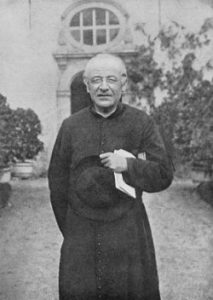
Boodschap van de vogels
(staande in het museum ingericht in ‘t kleen seminarie
te Rousselaere binst het schooljaar 1854 – 1855)
Hoort en neemt ons tale in achte,
kinders van het pluimgeslachte,
liefste broeders, groot en kleen,
die daar floddert ondereen.
Gij die al de krinkelwegen
in het hemelrijk gelegen
weet te vinden in uw vlucht
door de licht doorvlogen lucht,
gij die, diepe in ‘t loof gedoken
of in ‘t lommerwelf beloken
van het dik bewassen woud,
kunstig daar uw nestjes bouwt,
en in ‘t duiksel van de blâren
pluimkes, mos en wollenharen
samen tot een wiegske vlecht
en daar al uw hope in legt,
vol moederlijk verlangen,
vol van vreugde en blijde zangen:
d’hope van ‘t geheel geslacht,
van der bonten vederdracht! –
– eikes schoonste schoon der wereld,
eikes, blinkende en bepereld
en gespot rondom de schaal,
met het bleuzendste coraal:
geelwe, bruine, hemelblauwe,
fijn gevlekte, grijze, grauwe,
dicht gewolkte in ‘t helder groen,
van geen mensche na te doen;
zwart geplekt en wit gespegeld,
dicht gesijperd of getegeld,
eikes naar den rechten zin,
schoon van buiten, goed van bin’. –
Blijde blijde nachtegale,
eerlijk en van schoonder tale,
die zoo helder en zoo zacht
hellemt in den stillen nacht;
broeder leeuwerk, hemelwekker,
zevenzanger, bietjestekker,
slaande kwakkel ende vink;
en gij ook al, koddig ding,
dat, met ‘t steertjen opgesteken,
en het koofke recht gesteken,
kruipt en klavert op den stam
van den eeke stijf en stram;
vogelkes uit allen lande,
vogelkes van allen stande,
vogels kort en vogels lang,
vogels met of zonder zang,
vogels groot en vogels kleene,
vogels hoog en leeg te beene,
met een steert gelijk nen pauw,
met een steertje scherp en nauw,
een van lange lange pluimen,
of waar’t eentje van twee duimen;
hebt een snavel, recht of krom,
hebt een baard of geen daarom,
en een rooden kam benevens,
met een paar roo’ lillen tevens,
met een truizel bovenop,
en een koofken op den kop;
Gij moogt hoog, kort, lang, smal, breed zijn,
gij moogt alleszins gekleed zijn,
in ‘t fluweel of in ‘t satijn
of in ‘t donzig hermelijn;
zijden kleeren of kantoenen,
donker blauwe ofte helder groene;
grimselzwart of hagelblank,
kleur van hoog- of leegen rang;
goud, dat onder ‘t groene kronkelt,
groen, waar brandend goud op vonkelt,
bruin gebronzeld, lijk metaal,
rood, als een robinenstraal;
fijn geringeld en geregeld,
en gespikkeld en gespegeld,
zoet verdwijnend afgeleid,
‘t een in ‘t ander weggevleid
en ten nieten uit verbleekend;
kleur zoo stekende afgeteekend
en zoo net vaneen geplekt,
en zoo lief geschaaljedekt,
dat geen een van al de menschen
beter zoude doen of wenschen…
Zanggebroeders uit het woud,
met uw talen duizendvoud:
Gij, die kwinkt en gij, die kwedelt,
gij, die schuifelt en die vedelt,
gij, die neuriet, gij die tiert,
gij, die piept en tiereliert,
gij, die wistelt en die teutert,
gij, die knotert en die kneutert,
gij, die wispelt en die fluit,
gij, die tjiept en tureluit,
gij, die tatert en die kwettert,
gij, die klapt en lacht en schettert,
vezelt, orgelt, zingt en speelt,
lispelt, ritselt, tjelpt en kweelt,
gij, die kwinkelt lijk de vinken,
en alom gaat slaan en klinken,
met uw bekken, licht en los,
dat het kettert in den bosch:
fluiters, zangers ende slagers,
kermers, kriepers ofte klagers;
vogels die, op Gods geleê,
hier ten lande of over zee,
jaagt dat uwe vleren zoeven,
achter ‘t gone u mag behoeven,
achter ‘t gone uw voedsel is,
kooren, vruchten, vleesch of visch,
vliegen, motten, andre kerven,
al wat gij maar kunt verwerven.
Gij die, op uw lange been’,
diep in ‘t slijk zit, met uw teen’,
g’reed staat, met den hals gestopen,
tot dat iets komt uitgekropen,
dat gij seffens vastesnakt,
zoo gij menig puuitje pakt,
dat, van uit zijn vuile dijken,
zeer voorzichtig eens kwam kijken
wie dat ‘t was die daar zoo stond
op zijn erfelijken grond;
nauwlijks is de puit nog boven
of uw bek, omleeg gestoven,
lijk een vleiel op het kaf,
stekt den puit zijn lenden af…
Gij ook, dievig muschgebroedsel,
levende op eens anders voedsel,
gij, die elk ende een verwijt
met hetgeen gij zelve zijt.
Vogels zoet of fel van aarde,
alle vogels van der aarde,
hoe gewapend, hoe gereed,
vogels, hoe gij ook al heet,
wilt alhier uw gangen stieren,
komt en maant ook andre dieren,
dat ze komen neerstig aan
naar ons paradijs gegaan! –
– Sichten dat wij hier geraakten,
en, God lof, de dood gesmaakten ,
ai ‘t is heel een ander ding,
bij dat ‘t van te vooren ging!
‘t Was van ‘s morgens, alle dagen,
door de winden, door de vlagen,
eer de kop was uit de vlerk,
altijd arbeid, altijd werk;
honger zat ons achter d’hielen,
honger wilde ons al vernielen,
zoo daar een verzuimen do’st
van te werken voor den kost.
Des was ‘t altijd stelen, rooven,
op den akker, in de schooven:
al waar dat er iets bestond
dat was mage en borst gezond.
Honger zelfs kost ons bedwingen
menig een ter dood te bringen;
wee voor al ‘t onnoozel bloed
dat de honger storten doet!
Daarbij mochten wij, o dwazen,
nooit in rust en vreden azen,
maar daar schrikte ons altijd iets,
zelfs al was ‘t een enkle niets.
‘t Is dat wij nog niet en wisten,
dat de looze jagerslisten
en het sterven zelfs ons leidt
tot de schoone onsterfelijkheid.
Ja, wij dachten ‘t was ons schade,
maar het was ons een genade
dat een jagers tooverroer,
naar een welgemikten loer,
met een weêrlicht op ons afging,
dat het heen en weder paf ging.
Nooit en zullen ‘t wij verstaan:
maar als ‘t roer was afgegaan,
kwam daar iets in ons gevlogen
dat den honger heeft verjogen,
dat hij nooit meer weêr en kwam,
met zijn herdelooze vlam;
en de slaap, die ons voordezen,
altijd vlugtig plag te wezen,
hield ons, veertien dagen lang,
in het zoetste rustbedwang.
Wat ons toen van menschenhanden
wierd gedaan in de ingewanden
dat en spreekt geen vogeltaal,
zelfs al waar ‘t een nachtegaal.
Maar ‘t ontwekken… ‘t was ‘t herleven!
Zoo die slaap ons had begeven,
zag ons krystalinen oog
‘t alderwonderste vertoog:
rondom, in den blauwen schemel
van den schoonen voglenhemel
zaten wij onsterfelijk,
met nog menige, ons gelijk.
Andren, die wij nooit en zagen,
en zoo schoone pluimen dragen
dat geen een van ons alhier
reeken kan aan zulken zwier,
zaten daar ook, vol gezondheid,
in hun kunstgemeten rondheid,
groot- en schoonder als weleer,
edeldrachtig en vol eer.
Alle veedte is hier vervlogen,
hier wordt nimmermeer bedrogen
de arme vogel, noch verklikt,
noch bij nachte half dood geschrikt.
Vogel ende wezel mede,
leven hier in rust en vrede,
zittende, naar hun gemak,
huns getween op éénen tak.
Onze onsterfelijke voeten
moeten in geen slijk meer wroeten,
noch geen koude of hitte uitstaan,
om den nooddruft na te gaan:
spijs, die alle spijzen weerd is,
altijd nieuw en nooit verteerd is,
spijs, die, ongeëten, voedt,
altijd, altijd even goed;
spijs, die sterfloos voort doet leven,
wordt den vooglen hier gegeven
en hun buik met iet verzaad
dat daar nooit meer uit en gaat.
Hier is ‘t werken afgeropen,
‘t jagen, ‘t stelen end het stropen,
al dat ruize of moeite kost,
daarvan is men hier verlost.
Rusten is ons bezig hou’en,
rusten en malkaar aanschouwen
en beschouwd zijn en bezien
van de beste jonge liên,
die studenten, vol van goedheid,
vol van eedle grootgemoedheid,
die ons eertijds maakten schuw
maar die wij beminnen nu;
want ze minnen ons en maken
dat geen leed ons kan genaken,
ziekte, droef- of kwalijkheid,
hier in ‘s vogels zaligheid.
Al ‘t geluk dat wij genieten
komt van hun en komt voor nieten,
komt dat t’ alle wicht en maat
verre weg te boven gaat;
zoodat, sichten wij hierboven
rusten in onz’ Hemelhoven,
wij al wierden stom daarvan,
noch geen een die ‘t spreken kan,
of zijn wonderinge toogen,
of zijn hertlijk mededoogen
voor ons arrem broedertal,
nog geboeid in ‘s werelds dal.
Maar, bij overdaad van goedheid,
helpen zij onze onbevroedheid,
zeggen zij, in onze naam,
waar toe wij zijn onbekwaam: –
– Broeders, in ‘t gevang der wereld
nog aan ‘t leven vastgespereld
en gevangen, luistert hier:
Laat uw nutteloozen zwier,
laat de bosschen en de hagen
uwen zin niet meer behagen;
keert uw lang bedwellemde oog
eindlijk toch eens naar omhoog;
wilt hetgeen gij placht te duchten,
wilt het sterven niet meer vluchten,
vliegt den jager in ‘t gemoet,
dat hij u de gunste doet,
met zijn tooverroer, te zenden
eenig zaad in uwe lenden,
zaad des levens, dat de dood
zal doen vluchten uit uw schoot.
Komt! Wij reeken onze vlerken,
komt toch! Wilt niet langer werken,
leeft met ons in weelde en vreugd
en in altijd jonge jeugd.
Laat uw levensdraad verfijnen,
laat uw namen verlatijnen,
laat een oog van krystalijn
uw vernieuwd gezichte zijn.
Komt, en laat u weêr verjongen,
al het oude zij verdrongen,
wascht het morzig aardsche slijk
van uw voet gezwindelijk,
en, met kloeke verderslagen,
rap den lichtweg ingeslagen
die de dood voor ingang heeft,
maar die leedt waar dat men leeft. –
Menschen, tot ons heil geschapen,
grijpt ‘t onsterflijkmakend wapen,
‘t zij ons broederen lief of leed,
stelt u tot het jagen g’reed:
g’hebt de onsterflijkheid in handen,
zendt ze hun in de ingewanden!
Van den lichaamsvrechte ontdaan,
van der dood weêr opgestaan,
zendt ze, na kortstondig slapen,
hier geheel in ‘t nieuw geschapen.
Gij ook, die naar ‘t lieve land,
waar gij gingt aan moeders hand,
wederom uw stap gaat richten,
wilt ons broederen gaan berichten,
roept en dwingt ze, uit haag en heg,
toogt hun vriendelijk den weg;
zegt het hun op alle wijzen:
Komt ten voglenparadijzen,
waar gij eeuwig leven zult,
heel onsterflijk, – opgevuld. –
Guido Gezelle
(1830 – 1899)
Boodschap van de vogels
Uit: Vlaemsche dichtoefeningen
• fleursdumal.nl magazine
More in: Archive G-H, Archive G-H, Gezelle, Guido, Guido Gezelle
A poetic evaluation of what it means to grow up a girl, and how this intersects with disability/visual impairment.
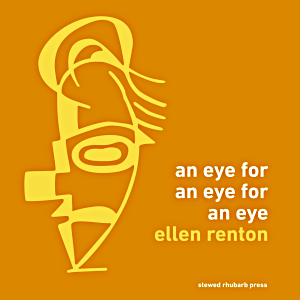 An Eye For An Eye For An Eye explores what it means to grow up a girl, and how this experience intersects with disability and visual impairment.
An Eye For An Eye For An Eye explores what it means to grow up a girl, and how this experience intersects with disability and visual impairment.
These poems concern themselves with looking: looking back over a childhood, looking again at what’s in front of us, and looking forward to possible futures. They visit girlhood and myth, blindness and friendship. They celebrate the freedom, shame, and awkwardness of coming to terms with our own bodies, and they ask what it means to look different and see differently.
Ellen Renton is a poet, performer, and theatre maker from Edinburgh whose writing has been published in a number of literary magazines. She she has performed at venues and festivals around the UK, is a co-founder of In The Works spoken word theatre company, and is the creator of the one woman poetry show Within Sight.
(…) They say, you are so brave and persistent.
You say thank you and ask for help.
They say, what do you think of this cosy lining?
You ask for help.
They say, I admire you, so brave and so persistent.
(fragment poem Ellen Renton)
An Eye For An Eye For An Eye
by Ellen Renton
Pamphlet For Stewed Rhubarb Press,
2021
£5.99
• fleursdumal.nl magazine
More in: #Editors Choice Archiv, - Book News, - Bookstores, Archive Q-R, Archive Q-R
Vintage Readers are a perfect introduction to some of the great modern writers: The celebrated bestselling author of The House on Mango Street “knows both that the heart can be broken and that it can rise and soar like a bird.
 Whatever story she chooses to tell, we should be listening for a long time to come” (The Washington Post Book World).
Whatever story she chooses to tell, we should be listening for a long time to come” (The Washington Post Book World).
A winner of the PEN/Nabokov Award for Achievement in International Literature and the prestigious MacArthur Fellowship, Sandra Cisneros evokes working-class Latino experience with an irresistible mix of realism and lyrical exuberance.
Vintage Cisneros features an excerpt from her bestselling novel The House on Mango Street, which has become a favorite in school classrooms across the country.
Also included are a chapter from her novel, Caramelo; a generous selection of poems from My Wicked Wicked Ways and Loose Woman; and seven stories from her award-winning collection Woman Hollering Creek.
SANDRA CISNEROS is a poet, short story writer, novelist and essayist whose work explores the lives of the working-class. Her numerous awards include NEA fellowships in both poetry and fiction, the Texas Medal of the Arts, a MacArthur Fellowship, several honorary doctorates and national and international book awards, including Chicago’s Fifth Star Award, the PEN Center USA Literary Award, and the National Medal of the Arts awarded to her by President Obama in 2016. Most recently, she received the Ford Foundation’s Art of Change Fellowship, was recognized among The Frederick Douglass 200, and was awarded the PEN/Nabokov Award for Achievement in International Literature.
Her classic, coming-of-age novel, The House on Mango Street, has sold over six million copies, has been translated into over twenty languages, and is required reading in elementary, high school, and universities across the nation.
In addition to her writing, Cisneros has fostered the careers of many aspiring and emerging writers through two non-profits she founded: the Macondo Foundation and the Alfredo Cisneros del Moral Foundation. She is also the organizer of Los MacArturos, Latino MacArthur fellows who are community activists. Her literary papers are preserved in Texas at the Wittliff Collections at Texas State University.
Sandra Cisneros is a dual citizen of the United States and Mexico and earns her living by her pen. She currently lives in San Miguel de Allende.
Vintage Readers
By Sandra Cisneros
Publisher: Vintage
Series: Vintage Readers
Language: English
2004
Pages: 208
ISBN: 9781400034055
ISBN-10: 1400034051
paperback
$12.95
• fleursdumal.nl magazine
More in: #Short Stories Archive, - Book News, - Bookstores, Archive C-D

Gentilesse
The firste stok, fader of gentilesse —
What man that desireth gentil for to be
Must folowe his trace, and alle his wittes dresse
Vertu to love and vyces for to flee.
For unto vertu longeth dignitee
And noght the revers, saufly dar I deme,
Al were he mytre, croune, or diademe.
This firste stok was ful of rightwisnesse,
Trewe of his word, sobre, pitous, and free,
Clene of his gost, and loved besinesse,
Ayeinst the vyce of slouthe, in honestee;
And, but his heir love vertu as dide he,
He is noght gentil, thogh he riche seme,
Al were he mytre, croune, or diademe.
Vyce may wel be heir to old richesse,
But ther may no man, as men may wel see,
Bequethe his heir his vertuous noblesse
(That is appropred unto no degree
But to the firste fader in magestee,
That maketh hem his heyres that him queme),
Geoffrey Chaucer
(1343 – 1400)
Gentilesse
• fleursdumal.nl magazine
More in: # Classic Poetry Archive, Archive C-D, Archive C-D, Geoffrey Chaucer
Pit Lullabies is Jessica Traynor’s third collection, following Liffey Swim (2014) and The Quick (2019).
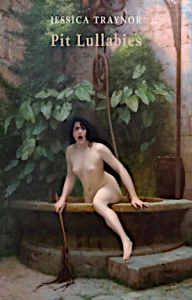 These intimate, visceral and often wickedly funny poems journey through the darker days of new parenthood, teasing out the anxieties which plague us when night falls. Violence against women, the destruction of our environment, the poisons and pitfalls of 21st-century living are explored here in poems by turns lyrical and earthy, yearning and angry. They mine gold from the darkness and seek luminescence in the deepest oceans.
These intimate, visceral and often wickedly funny poems journey through the darker days of new parenthood, teasing out the anxieties which plague us when night falls. Violence against women, the destruction of our environment, the poisons and pitfalls of 21st-century living are explored here in poems by turns lyrical and earthy, yearning and angry. They mine gold from the darkness and seek luminescence in the deepest oceans.
Jessica Traynor was born in Dublin in 1984 and is a poet, essayist and librettist. Her debut collection, Liffey Swim (Dedalus Press, 2014), was shortlisted for the Strong/Shine Award and in 2016 was named one of the best poetry debuts of the past five years on Bustle.com. Her second collection, The Quick, was a 2019 Irish Times poetry choice. A Place of Pointed Stones, a pamphlet commissioned by Offaly County Council,was published by The Salvage Press in 2021. Her third collection, Pit Lullabies, was published by Bloodaxe Books in March 2022. It was a Poetry Book Society Recommendation and was an Irish Times poetry books of the year choice for 2022. Pit Lullabies was shortlisted for the inaugural Yeats Society Sligo’s Poetry Prize in 2023.
She has received commissions for poems from BBC Radio 4, The Arts Council of Ireland, The Model Gallery Sligo, The Salvage Press, VISUAL Carlow, Dún Laoghaire–Rathdown County Council and The Poetry Programme (RTÉ), and awards including the Hennessy New Writer of the Year, the Ireland Chair of Poetry Bursary, and the Listowel Poetry Prize. In 2016, she was named one of the ‘Rising Generation’ of poets by Poetry Ireland. She is the recipient of the Lawrence O’Shaughnessy Award for Poetry 2023.
She reviews poetry for The Irish Times, RTÉ Radio 1’s Arena, and for Poetry Ireland Review. She is an inaugural Creative Fellow of UCD, where she completed her MA in Creative Writing in 2008, and has held residencies including the Yeats Society, Sligo, and Carlow College. She was Dún Laoghaire-Rathdown Writer in Residence for 2021-22 and is University of Galway Writer in Residence for 2023. She is poetry editor at Banshee.
Pit Lullabies
(Poems)
by Jessica Traynor
Publisher: Bloodaxe Books
2022
Language: English
ISBN-10: 1780376065
ISBN-13: 978-1780376066
Paperback
96 pages
£10.99
Shortlisted for the Yeats Society Sligo’s Poetry Prize 2023
• fleursdumal.nl magazine
More in: #Editors Choice Archiv, - Book News, - Bookstores, Archive S-T, Archive S-T
Maud Joiret est née en 1986 à Bruxelles. Chroniqueuse notamment pour Le Carnet et les Instants, elle est programmatrice littéraire. Cobalt est son premier recueil de poésie. Quelques textes ont paru aussi pour la revue Boustro (numéro VII), Passa Porta, Poetenational.be, Bela. Lauréate d’une bourse de la Fédération Wallonie-Bruxelles – Bourse de découverte 2020
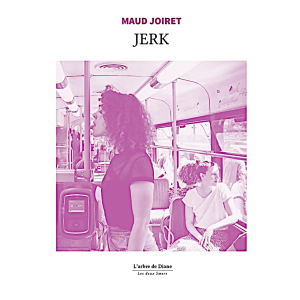
Maud Joiret: Jerk
Arbre de Diane,
coll. « Les deux sœurs »,
2022
ISBN: 978-2-930822-21-1
89 pages
€12,00
Bibliographie
Jerk (2022)
Cobalt (2019)
Marées vaches
“ Tu deviendrais muet sans même le savoir
Tu garderais secrètes tes plaintes et tes larmes
Tu écrirais des poèmes
que personne ne lirait
Les jours impairs, tu te cuisinerais des pâtes
pourvu qu’elles soient cuites à point
juste comme elle les aime.”
• fleursdumal.nl magazine
More in: #Editors Choice Archiv, - Book News, - Bookstores, Archive I-J, Archive I-J, Historia Belgica
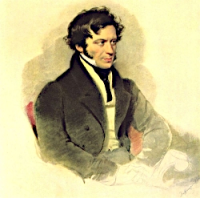
An den Mond
Wandle, wandle, holder Schimmer!
Wandle über Flur und Au,
Gleitend, wie ein kühner Schwimmer,
In des stillen Meeres Blau.
Sanft im Silberglanze schwebest
Du so still durchs Wolkenmeer,
Und durch deinen Blick belebest
Du die Gegend rings umher.
Manchen drücket schwerer Kummer,
Manchen lastet Qual und Pein;
Doch du wiegst in sanften Schlummer
Tröstend ihn, voll Mitleid, ein.
Sanfter, als die heiße Sonne,
Winkt dein Schimmer Ruh und Freud,
Und erfüllt mit süßer Wonne,
Tröstung und Vergessenheit.
Hüllst in dichtbewachsnen Lauben
Mit der sanften Fantasie
Ganz den Dichter; machst ihn glauben,
Seine Muse weiche nie.
Franz Seraphicus Grillparzer
(Wien 1791 – 1872)
An den Mond (Gedicht)
• fleursdumal.nl magazine
More in: # Classic Poetry Archive, Archive G-H, Archive G-H, Grillparzer, Franz
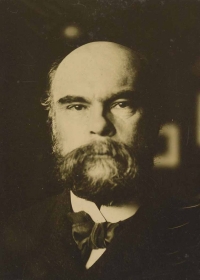
Mon rêve familier
Je fais souvent ce rêve étrange et pénétrant
D’une femme inconnue, et que j’aime, et qui m’aime,
Et qui n’est, chaque fois, ni tout à fait la même
Ni tout à fait une autre, et m’aime et me comprend.
Car elle me comprend, et mon cœur transparent
Pour elle seule, hélas ! Cesse d’être un problème
Pour elle seule, et les moiteurs de mon front blême,
Elle seule les sait rafraîchir, en pleurant.
Est-elle brune, blonde ou rousse ? Je l’ignore.
Son nom ? Je me souviens qu’il est doux et sonore,
Comme ceux des aimés que la Vie exila.
Son regard est pareil au regard des statues,
Et, pour sa voix, lointaine, et calme, et grave, elle a
L’inflexion des voix chères qui se sont tues.
Paul Verlaine
(1844 – 1896)
Mon rêve familier
Poèmes saturniens
Photo: Willem Witsen, 1892
• fleursdumal.nl magazine
More in: Archive U-V, Archive U-V, Verlaine, Paul
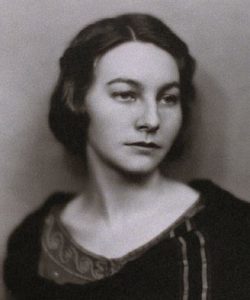
The Vast Hour
All essences of sweetness from the white
Warm day go up in vapor, when the dark
Comes down. Ascends the tune of meadow-lark,
Ascends the noon-time smell of grass, when night
Takes sunlight from the world, and gives it ease.
Mysterious wings have brushed the air; and light
Float all the ghosts of sense and sound and sight;
The silent hive is echoing the bees.
So stir my thoughts at this slow, solemn time.
Now only is there certainty for me
When all the day’s distilled and understood.
Now light meets darkness: now my tendrils climb
In this vast hour, up the living tree,
Where gloom foregathers, and the stern winds brood.
Genevieve Taggard
(1894 – 1948)
The Vast Hour
• fleursdumal.nl magazine
More in: # Classic Poetry Archive, Archive S-T, Archive S-T
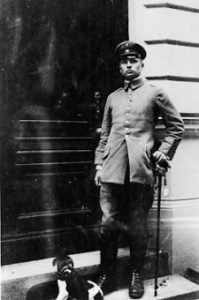
Schwermütig kam die Nacht …
Schwermütig kam die Nacht. Ich bin allein.
Rings wuchern Bücher, Möbel und Tapeten
Im gelben Licht der Lampe fremd und kalt.
Wie weh tun Sehnsucht, Nacht und Einsamsein!
Still möcht ich in dein junges Leben treten
Wie eine Wanderschaft durch einen grünen Wald.
Hans Ehrenbaum-Degele
(1889 – 1915)
Schwermütig kam die Nacht …
• fleursdumal.nl magazine
More in: #Experimental Poetry Archive, *War Poetry Archive, - Archive Tombeau de la jeunesse, Archive E-F, Archive E-F, Expressionism

En la forest de Longue Attente
En la forest de Longue Attente
Entrée suis en une sente
Dont oster je ne puis mon cueur,
Pour quoy je vis en grant langueur,
Par Fortune qui me tourmente.
Souvent Espoir chacun contente,
Excepté moy, povre dolente,
Qui nuit et jour suis en douleur
En la forest de Longue Attente.
Ay je dont tort, se je garmente
Plus que nulle qui soit vivante ?
Par Dieu, nannil, veu mon malheur,
Car ainsi m’aid mon Createur
Qu’il n’est peine que je ne sente
En la forest de Longue Attente.
Marie De CLÈVES
(1426-1487)
En la forest de Longue Attente
• fleursdumal.nl magazine
More in: # Classic Poetry Archive, Archive C-D, Archive C-D
This keenly anticipated new collection from the Costa Poetry Award-winner speaks ‘out of fear and grief into splendour and joy’.
 Following their award-winning debut, Flèche (2019), comes Mary Jean Chan’s gleaming second collection: Bright Fear. Through poems which engage fearlessly with intertwined themes of identity, multilingualism and postcolonial legacy, Chan’s latest work explores a family’s evolving dynamics, as well as microaggressions stemming from queerphobia and anti-Asian racism that accompanied the Covid pandemic.
Following their award-winning debut, Flèche (2019), comes Mary Jean Chan’s gleaming second collection: Bright Fear. Through poems which engage fearlessly with intertwined themes of identity, multilingualism and postcolonial legacy, Chan’s latest work explores a family’s evolving dynamics, as well as microaggressions stemming from queerphobia and anti-Asian racism that accompanied the Covid pandemic.
Yet Bright Fear remains deeply attuned to moments of beauty, tenderness and grace. It asks how we might find a home within our own bodies, in places both distant and near, and in the ‘constructed space’ of the poem. The contemplative central sequence, Ars Poetica, traces the radically healing and transformative role of poetry during the poet’s teenage and adult years, culminating in a polyphonic reconciliation of tongues. Throughout, Chan offers us new and galvanising ways to ‘withstand the quotidian tug- / of-war between terror and love’.
Mary Jean Chan is the author of Flèche (Faber, 2019), which won the Costa Book Award for Poetry and was shortlisted for the International Dylan Thomas Prize, the John Pollard Foundation International Poetry Prize, the Jhalak Prize, the Seamus Heaney Centre First Collection Poetry Prize and a Lambda Literary Award. Chan won the 2018 Geoffrey Dearmer Prize and was shortlisted for the Forward Prize for Best Single Poem in 2017 and 2019, receiving an Eric Gregory Award in 2019. Chan co-edited the anthology 100 Queer Poems (Vintage, 2022) with Andrew McMillan, and is a judge for the 2023 Booker Prize. Born and raised in Hong Kong, Chan serves as Senior Lecturer in Creative Writing (Poetry) at Oxford Brookes University and lives in Oxford.
Most mornings, you see the face
of a boy in the mirror. You
expect to fall in love with him,
someday. Meanwhile, your fingers
brush the wrist of another girl as
you jostle into the assembly hall,
and you understand that sin was
never meant to be easy, only
sweet. What might light up the
pond you sat beside in dreams,
eyeing skin and so much depth it
would be years before you dared?
What curvature of tongue might
you taste, as if another’s breath
were blessing? One night, you find
yourself back there. You dream.
A voice says: Hell is not other
people. You sink, stripped of the
glowing dress you wore for
thousands of days.
(fragment poem)
Bright Fear
by Mary Jean Chan
(Poems)
Publisher: Faber & Faber;
Main edition
3 August 2023
Language: English
ISBN-10: 0571378900
ISBN-13: 978-0571378906
Dimensions: 15.8 x 0.6 x 20.5 cm
Paperback
72 pages
£10.99
• fleursdumal.nl magazine
More in: #Editors Choice Archiv, - Book News, - Bookstores, Archive C-D, Archive C-D, Racism
Thank you for reading Fleurs du Mal - magazine for art & literature